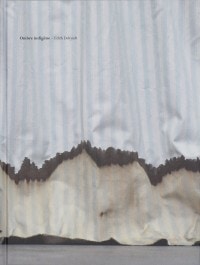Ombre Indigène
For the first retrospective of her work in Brussels, Belgian artist Edith Dekyndt (who lives and works in Tournai and Berlin), has elaborated an approach putting new creations in dialogue with already existing works, faithful to her practice of inhabiting an exhibition location and its environment and taking as a starting point its substances, materials and specific elements.
Her works appeal to us through their strong material and corporeal character, and despite their sometimes demateria lised and abstract appearance, taking the form of video recordings, slide projections or minimal installations, they always tell us about the material composition of the world. Dekyndt designs complex forms and surfaces in permanent mutation, through associations between material, environment and support. She applies biochemical, organic or nonorganic processes on unusual supports, combining the abstract and the concrete, the particular and the universal.
Like an amateur scientist, she experiments and renders tangible and visible underlying and intrinsic processes, using techniques such as fermentation, accumulation, extraction, reduction or excess of energetic fluxes. In doing so, she also questions the difference between creation and production. By standing discreetly behind the effect produced over time by the interaction of elements on a support, she questions the artist’s intervention when compared to a scientist and technological approach. In other words, she questions on one hand what can result from the domination of man over his environment, and on another of its proximity with the making of bread dough (a fermentation of cereals and water). The works’ articulation creates a back and forth movement between domestic and public territories.
The first floor starts with a large surface of ‘domestic’ dust, works made with precious metals, dried earth and burnt objects, and even with a screening accompanied by a soundtrack with the song from a Native American rain dance.
The second floor presents several works in relation with the history of air. In Ypres, Belgium, was perpetrated the first gas bombardment in history, and in Brussels can be found a particular bacteria present in the entire Senne valley used in the making of specific beers such as the Lambic. Other works conjure the presence of copper in the building, as well as wild ferments in the air we breathe.
Curateur : Dirk Snauwaert

